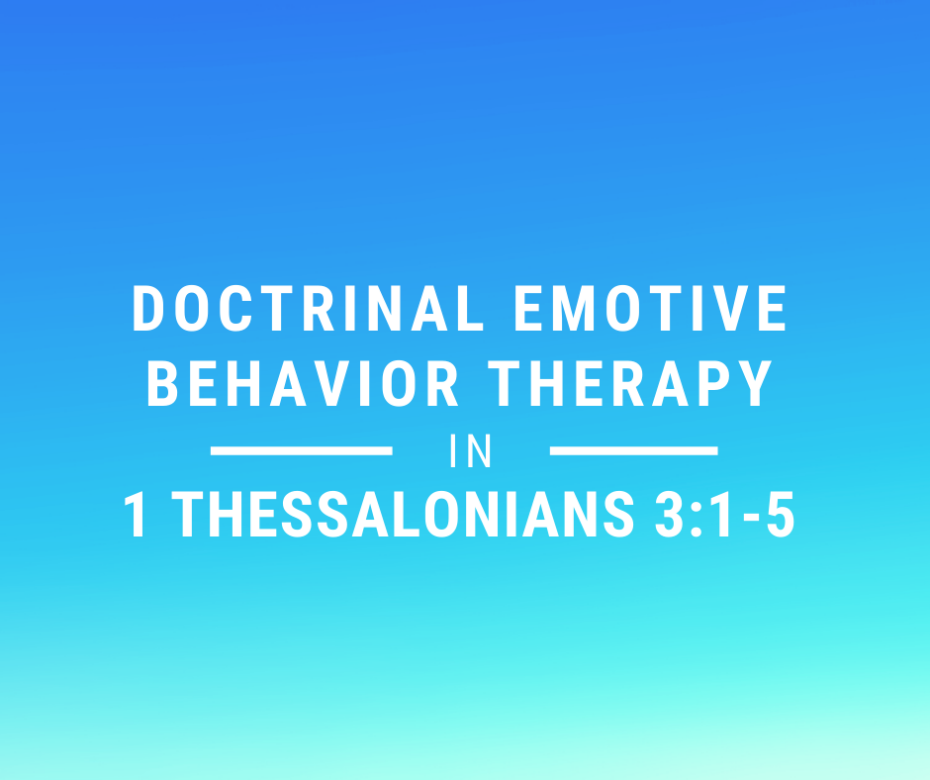In an earlier post, I talked about what I call Doctrinal Emotive Behavior Therapy (DEBT). It is similar to Albert Ellis’s Rational Emotive Behavior Therapy (REBT), but with a Biblical basis. REBT treats patients with emotional disturbances by challenging their irrational beliefs and convincing the patient to adopt more rational beliefs. That should lead to greater emotional stability.
REBT has a simple ABCDE method of therapy. Put very simply, according to REBT, people get emotionally disturbed (C) because of their beliefs (B) about a situation or activating event (A). The REBT therapist then disputes (D) those beliefs in order to effect change (E) in the patient. In REBT, a change of mind is supposed to bring a change of feeling.
I find that approach very common-sensical, except for one thing—instead of taking postmodernism and moral relativism as my standard for what counts as “rational” or “irrational” (as REBT therapists seem to do), I go to the Bible. I dispute my irrational beliefs with Bible doctrine.
In this blog, I want to show DEBT at work in Paul’s epistle to the Thessalonians. Paul will recognize that the Thessalonians are disturbed due to their beliefs about a situation. Paul will then dispute those beliefs with doctrine.
For example, in 1 Thess 3:1-5, Paul writes:
Therefore, when we could no longer endure it, we thought it good to be left in Athens alone, and sent Timothy, our brother and minister of God, and our fellow laborer in the gospel of Christ, to establish you and encourage you concerning your faith, that no one should be shaken by these afflictions; for you yourselves know that we are appointed to this. For, in fact, we told you before when we were with you that we would suffer tribulation, just as it happened, and you know. For this reason, when I could no longer endure it, I sent to know your faith, lest by some means the tempter had tempted you, and our labor might be in vain.
A. What is the activating event?
Earlier, Paul told the Thessalonians they had suffered “much affliction” (1 Thess 1:6). Likewise, he had been “spitefully treated at Philippi” (1 Thess 2:2). That is, he suffered persecution, too. And in our passage above, Paul again mentions “these afflictions” (v 3). Let’s say that afflictions are the activating event (A).
C. What is the emotional or behavioral consequence?
Paul says the Thessalonians were “shaken.” The Thessalonians were so shaken that Paul worried they might fall away from the faith so that his “labor might be in vain” (v 5). Paul did not want to see that happen. He wanted the Thessalonians to keep on walking in the faith.
Now, remember, many people assume that A directly causes C. But we will argue that it is really your beliefs (B) about A that cause C. With that in mind…
B. What did the Thessalonians believe about those afflictions to produce their emotional disturbance?
Paul does not say exactly. That’s the trouble with only being able to read one-half of the Thessalonian correspondence. We can only guess at what they believed based on what Paul says.
Perhaps they were shaken because they wrongly believed that afflictions were a sign of God’s displeasure or of God’s plan going wrong or proof that the Christian message was not true. Or maybe they thought that believing the gospel guaranteed a comfortable and prosperous life on earth. I don’t know. But whatever they believed, Paul thought they needed correction.
D. How does Paul dispute their beliefs with doctrine?
Paul reminded the Thessalonians that these afflictions were not accidental. On the contrary, he was appointed to suffer affliction for the gospel, just as he told them before:
for you yourselves know that we are appointed to this. For, in fact, we told you before when we were with you that we would suffer tribulation, just as it happened, and you know.
In other words, the afflictions were part of the plan. Paul expected them. So did Timothy. And so should the Thessalonians. That doesn’t mean they should enjoy their afflictions. But it should not cause them to be shaken to the point of falling from the faith.
E. What was the intended effect of this doctrinal disputation?
Paul says his goal is to:
establish you and encourage you concerning your faith.
Clearly, Paul expected the doctrinal truths he taught to have an impact on their state of mind. By replacing their false beliefs about affliction with the truth that he was appointed to afflictions, Paul expected the Thessalonians to be established and encouraged instead of being shaken.
They would still go through the afflictions, but with a different set of beliefs. They would see the afflictions in a new light—as part of what God appointed for them. And that knowledge should bring them encouragement, not doubt.
Is that what happened? We don’t know. But when Timothy came back with a good report of the Thessalonians’ walk in the faith, that comforted Paul in his afflictions:
But now that Timothy has come to us from you, and brought us good news of your faith and love, and that you always have good remembrance of us, greatly desiring to see us, as we also to see you—therefore, brethren, in all our affliction and distress we were comforted concerning you by your faith (1 Thess 3:6-7).


